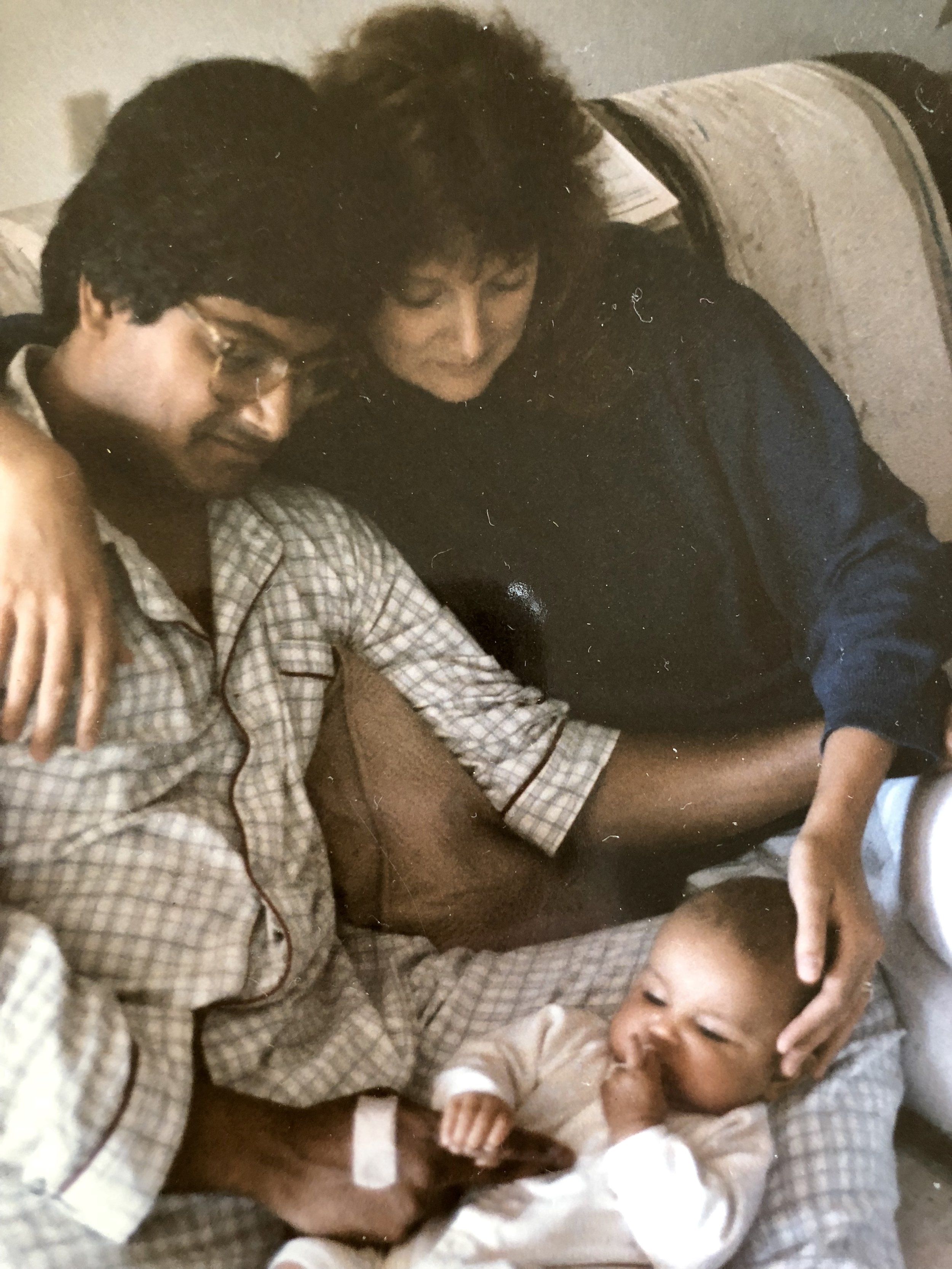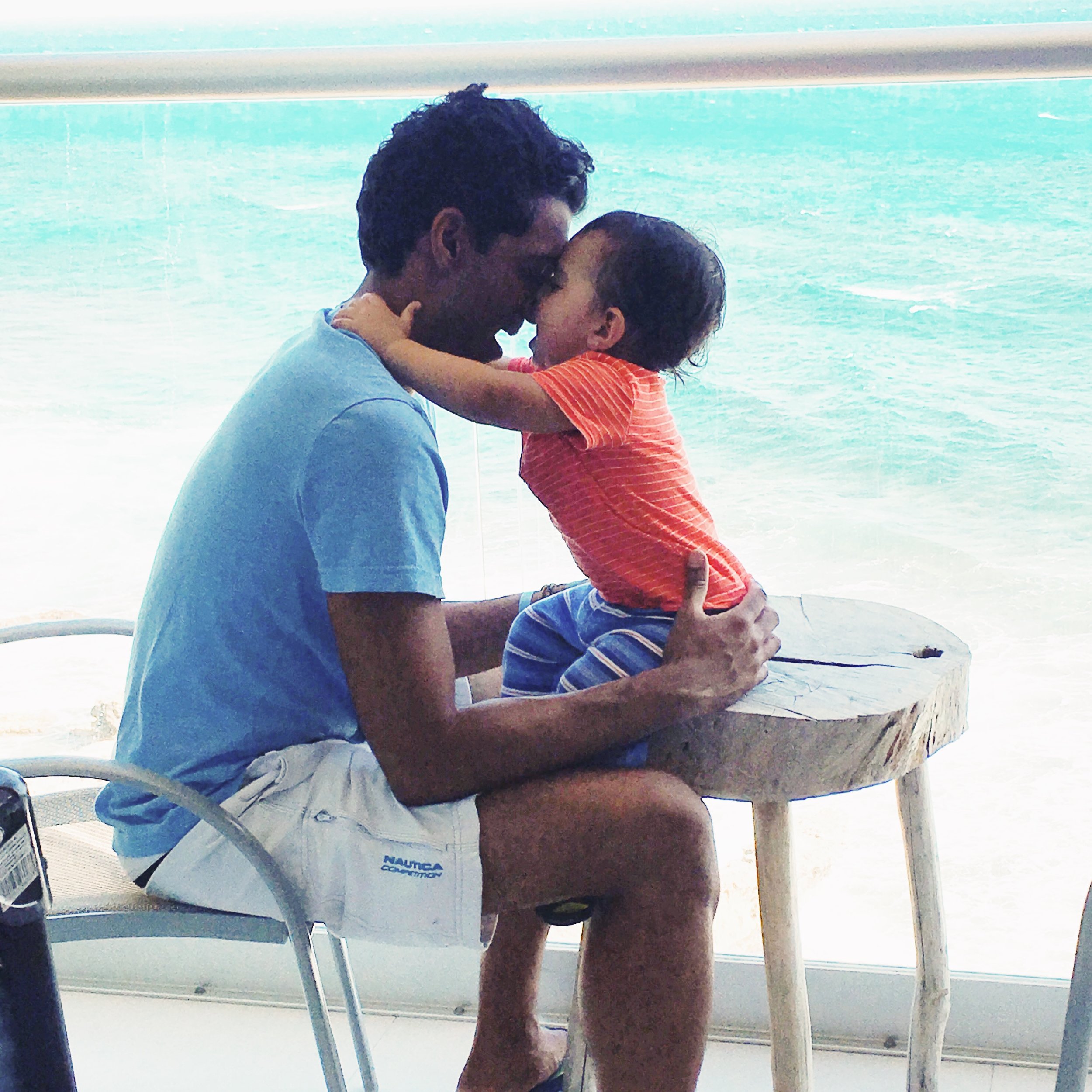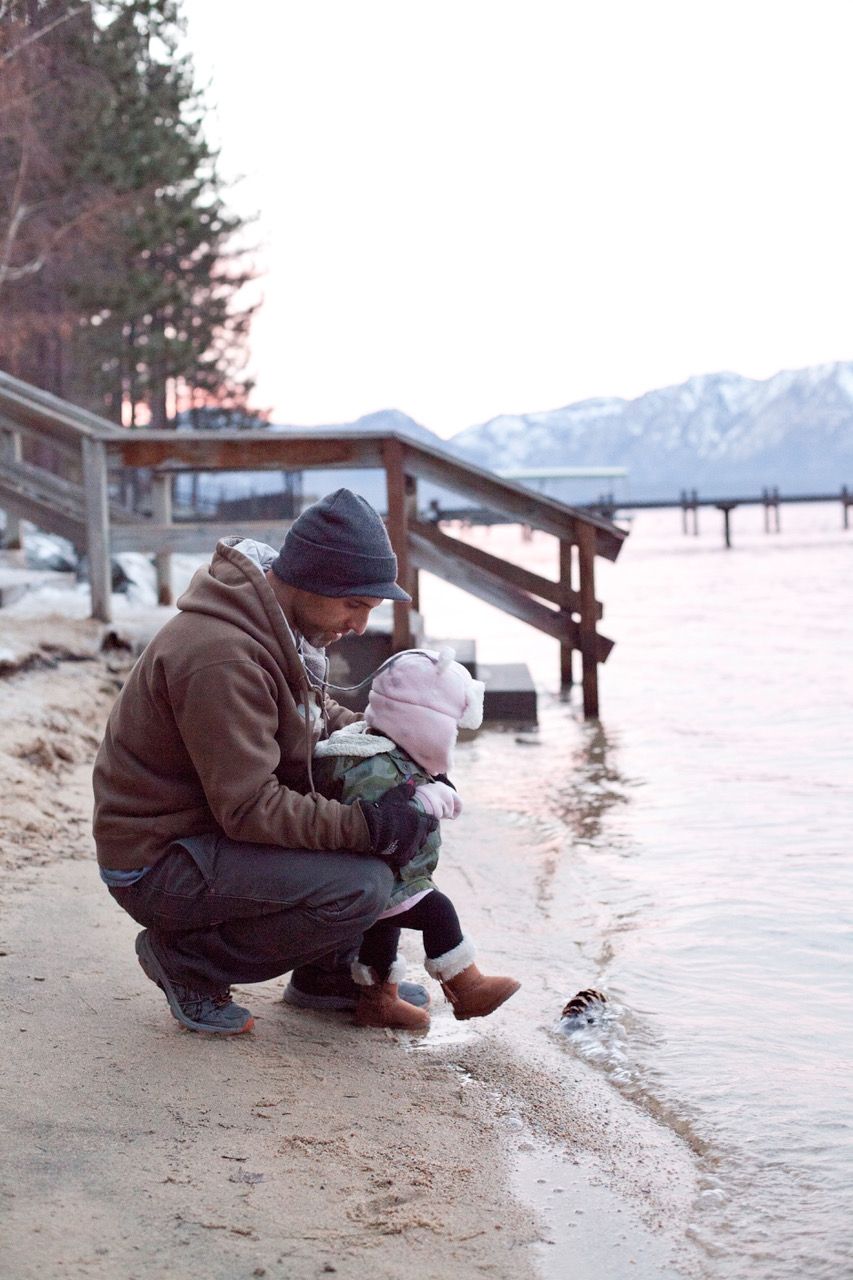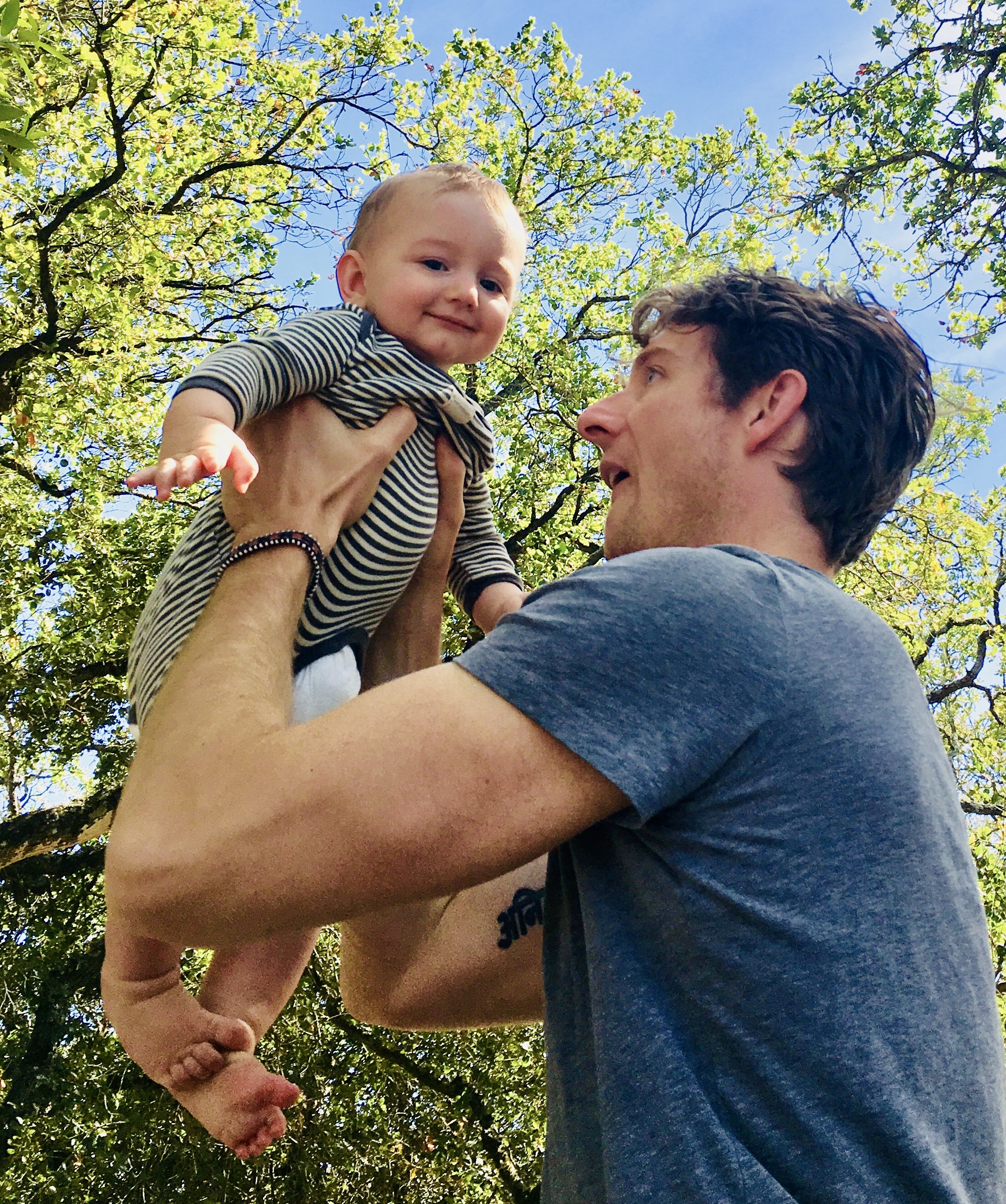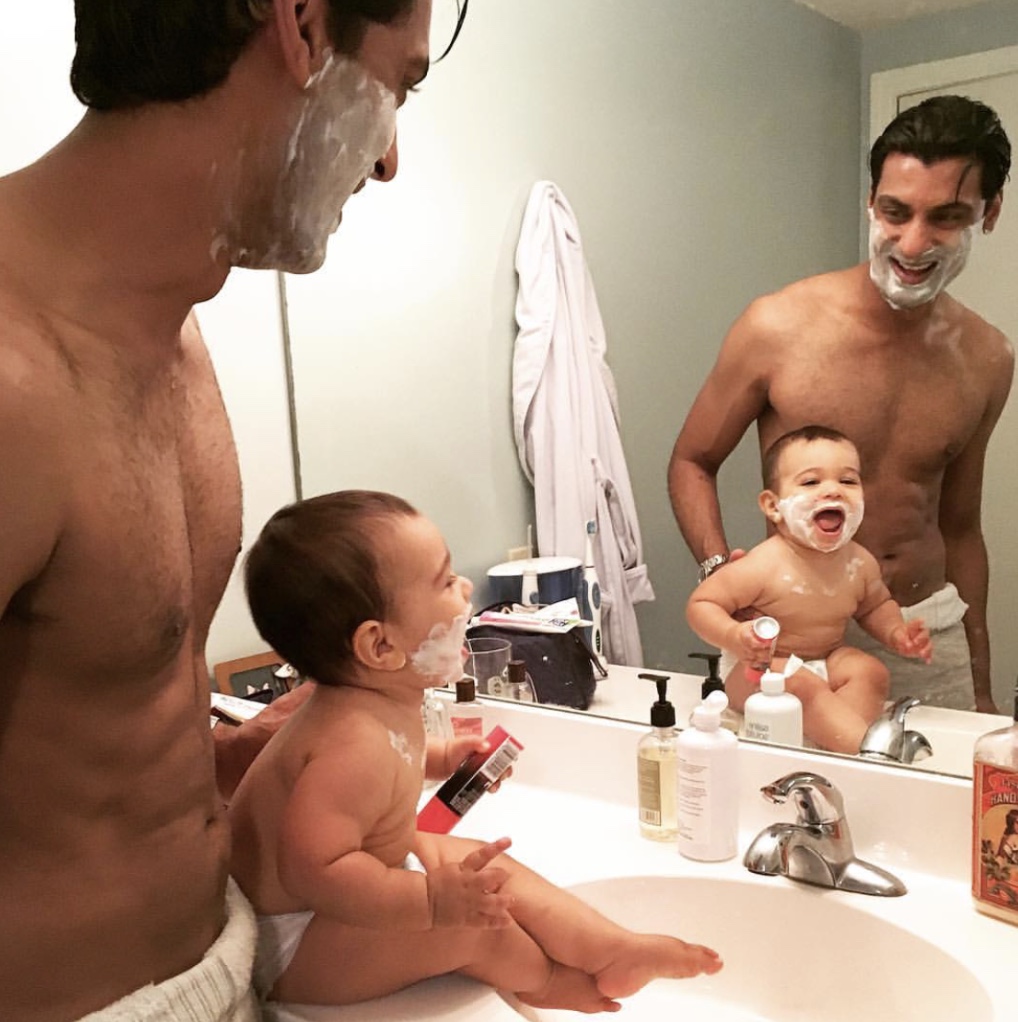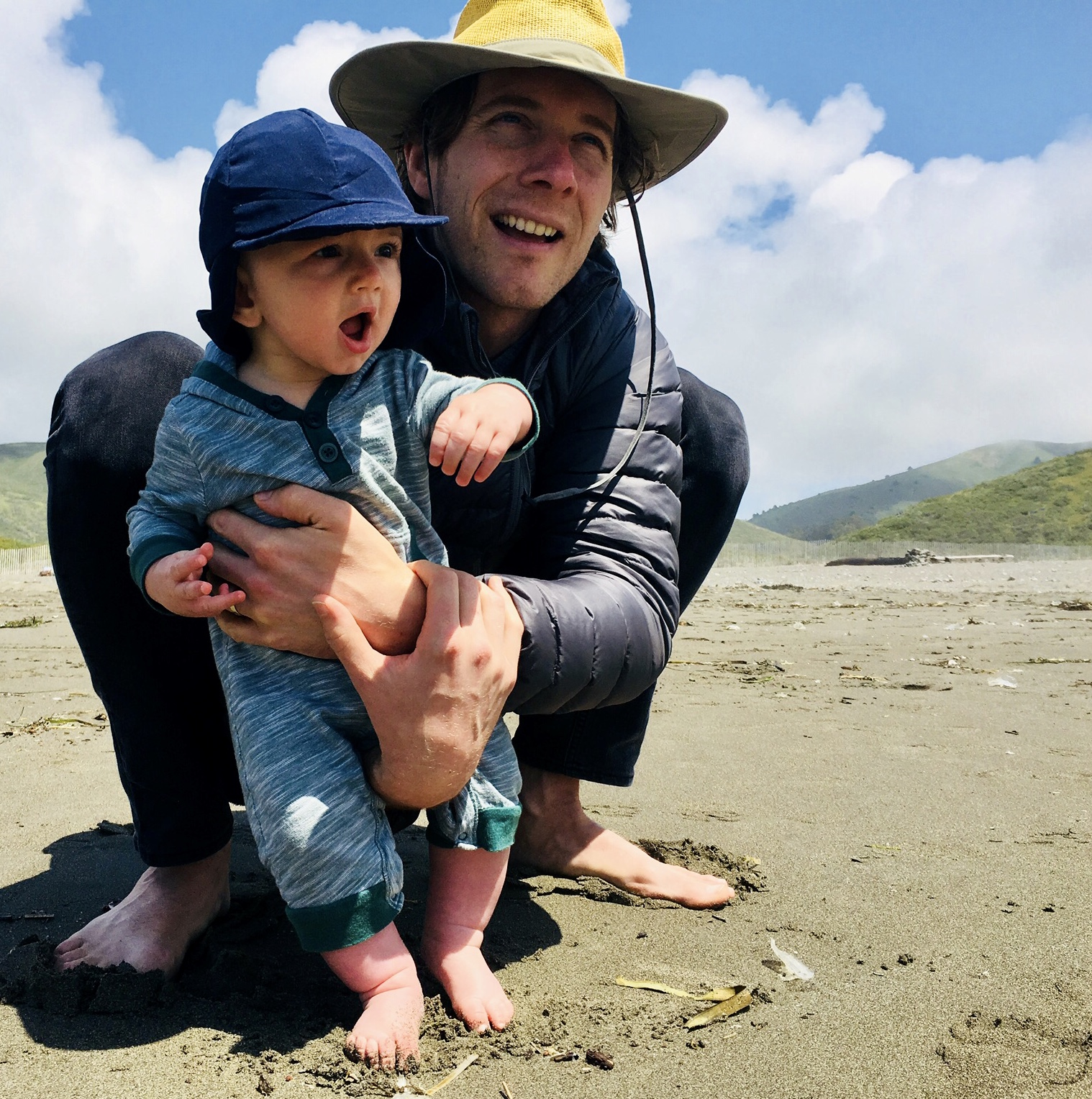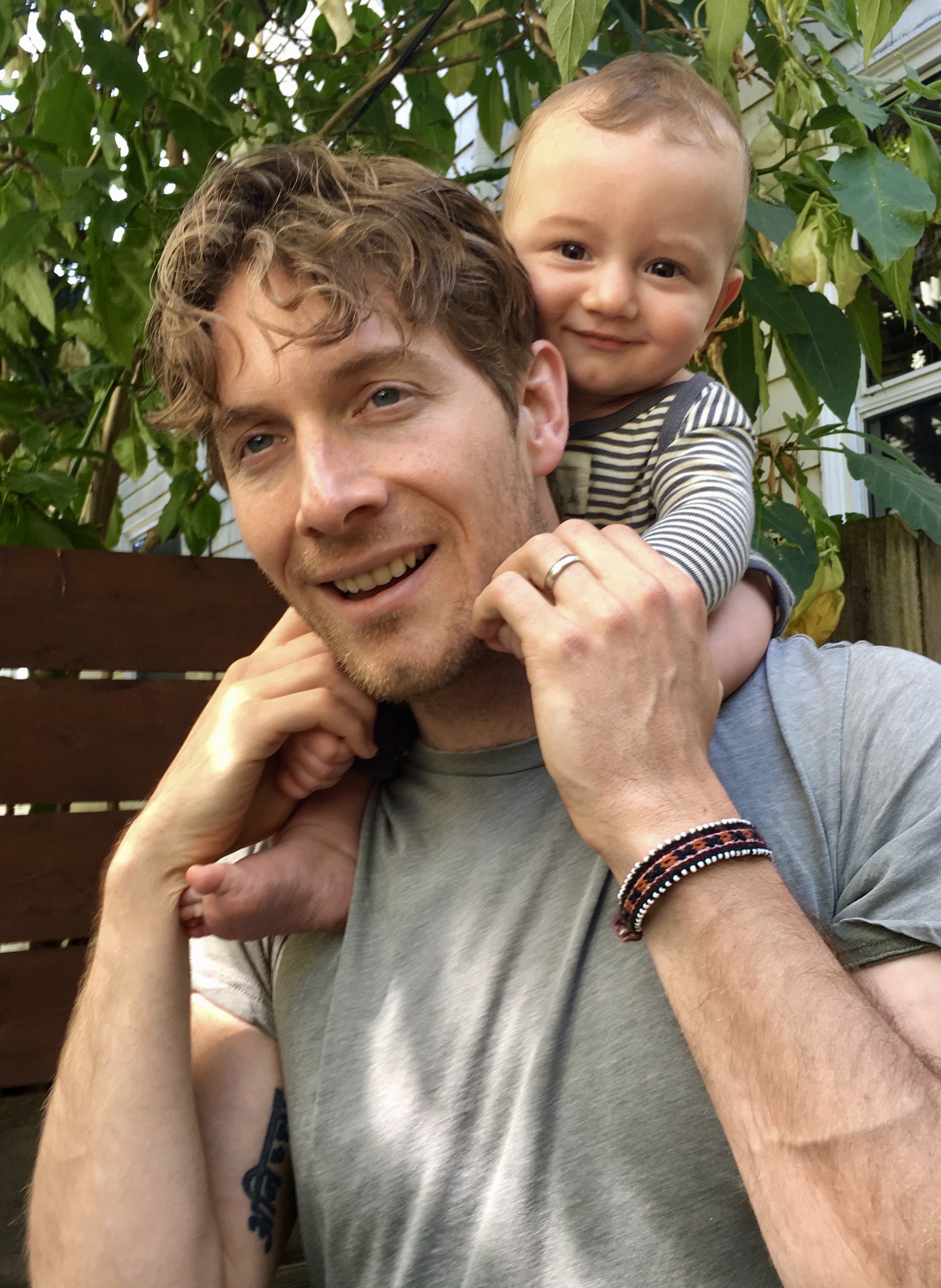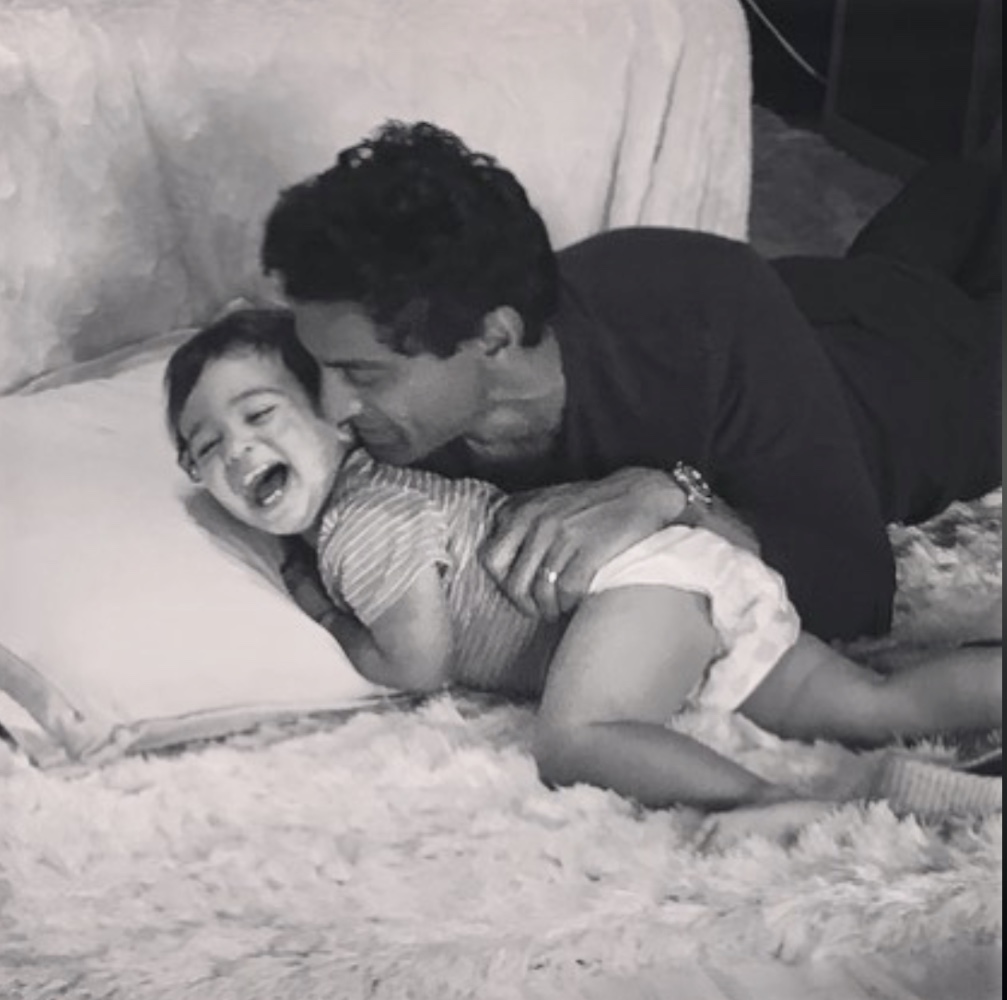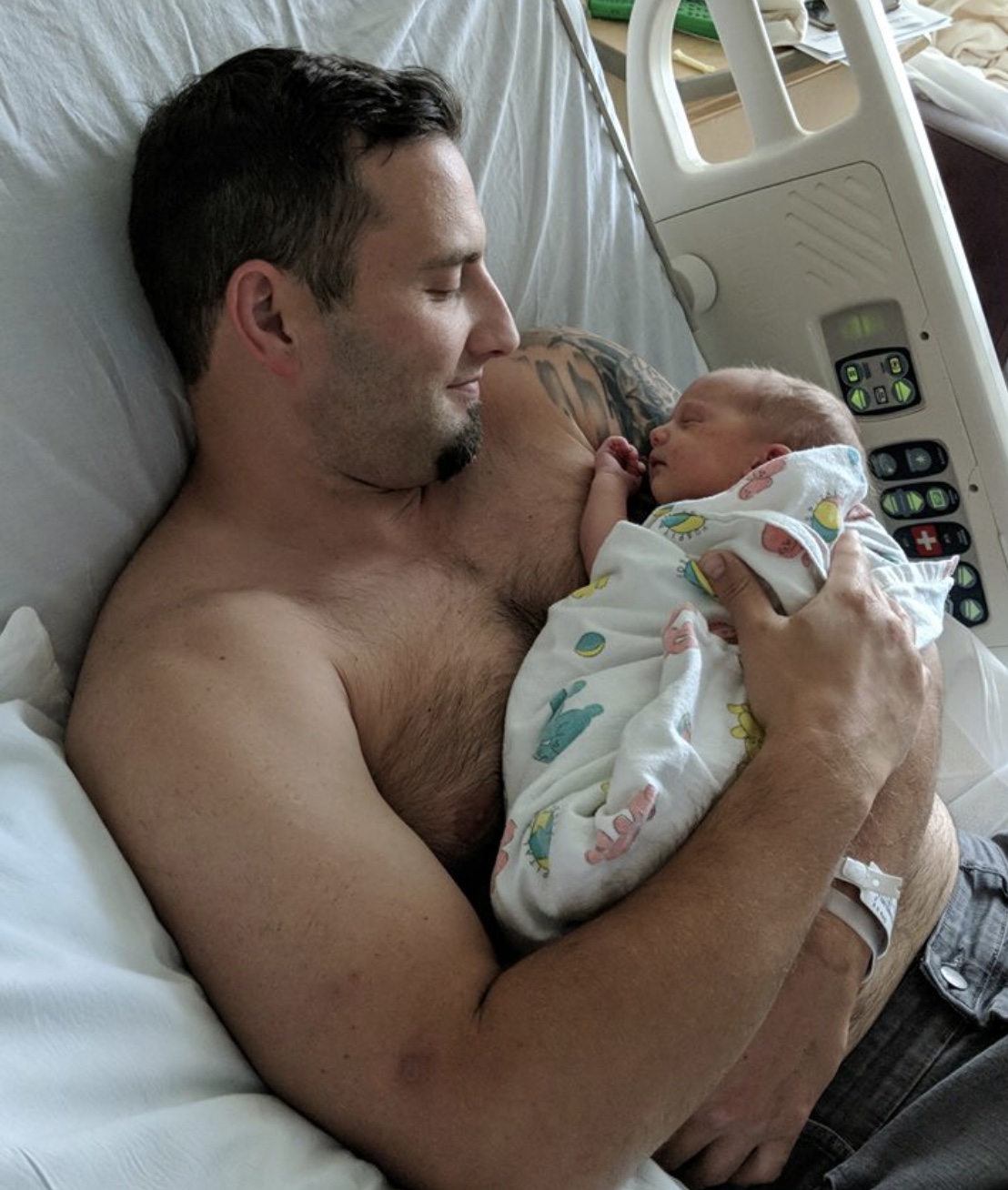When co-parents tend to their relationship first, everyone benefits.
Note: This blog post is primarily about fathers (in honor of Father's Day) and particularly fathers who are partnered with women. This is just one of the many types of family structures that exist and I'm interested in all types of family structures. However, much of the detailed research on co-parenting involves heterosexual relationships. The good news is that many of the findings here that apply to fathers in heterosexual relationships also apply to co-parents of all kinds.
photo credit E. Frost
Arms heavy with meals I had prepared, I crossed the sunlit porch, slipped off my shoes, and walked through the front door. I found my friends, new parents, standing quietly side by side in their darkened kitchen. Shaye, their tiny newborn, had just awakened from his nap and was resting on his mama’s shoulder. A hushed atmosphere of disheveled slumber lingered.
Jed, Shaye’s father, turned to investigate the food I’d brought, lifting lids from the containers and filling his plate with chicken. “Do you want some?” he asked Emily, his wife.
“Later,” she said, sitting down on the couch to talk. Little Shaye lay quietly on her lap, attentive to sights and sounds, while Jed ate beside us.
Soon it was time to breastfeed, and Jed stood to bring Emily a pillow and a glass of water. When feeding was finished, Jed brought Emily her lunch, took Shaye from her arms, and burped him; then they disappeared for a walk in the afternoon sunlight while Emily turned to talk with me. After a while, Jed came back in, changed Shaye’s diaper, and, standing, started to rock the baby back to sleep. When Shaye fussed, his parents passed him back and forth until he settled.
I was in awe of this ballet, of Jed and Emily’s seamless choreography. Each shift in task was preceded by a considerate, “Do you want…?” “Could you please…” Or a “How are you doing?” This was true partnership in action.
Co-parent collaboration is good for the entire family
Carolyn Pape Cowan and Phil Cowan, psychologists emeriti at the University of California at Berkeley, have studied families for over 40 years. Parenting is hard, they acknowledge, and the transition to parenthood is an especially vulnerable time. More than 50 studies worldwide show that, as joyous and welcome as a new child might be, trouble usually starts to brew in the parents’ relationship after a birth. There’s too much to do, sleep is short, and freedom is seriously curtailed—a recipe for conflict and dissatisfaction that can place everyone at risk.
But when parents tend to their relationship and learn to collaborate constructively, everyone is much more likely to stay on track and thrive. Through several major studies involving more than 1,000 couples in very diverse walks of life, the Cowans found that when parents nurture their own bond, it maintains relationship satisfaction across the challenge of parenting—for years. It also improves the parents’ relationships with their children. In turn, the children are happier, and more sociable, and secure. Notably, tending to the co-parents’ relationship creates more benefits for the family than even parenting classes, men’s groups, or moms’ groups that tend to overlook couples’ issues.
photo credit E. Dorrien
Why is nurturing the couple relationship so powerful, even for the children?
“The relationship between the parent figures creates the atmosphere in which children are growing,” replied Carolyn. “If parents have unresolved high conflict, it makes children nervous and preoccupied with their parents; they end up not doing as well socially or academically. But if parents are warm and respectful, and treat each other kindly and gently, the children feel secure and therefore, free to explore life. They also have a positive model for their own lives as to how relationships should work.”
Phil added, “There are ‘spillover’ effects. That is, if a partner is unhappy, it’s very difficult to turn around and be a nurturing, supportive parent to the child. And our research shows that when a couple functions effectively as a team, it helps them ward off stresses and strains from outside the family, like job stress, poverty, or difficult life events.”
A healthy relationship invites dads in
photo credit W. Johnson
One of the benefits of this early collaboration, the Cowans report, is that fathers feel more welcomed into the emotional labor and rewards of parenting.
“We know from our own and others’ research that one of the best predictors of father involvement is the relationship with the mom,” says Phil. “And that’s true regardless of the family structure, whether they are biological parents, adoptive parents, stepparents, divorced, cohabitating, or married. If you improve the relationship between the co-parents, partners are happier, and it draws dads in, not only to the relationship but into the family.”
And dads matter.
They want to be involved in parenting. A recent survey on parents of 2200 Millennials and Generation Xers revealed that 90% of the fathers said being a parent was their greatest joy, and 73% said their lives began when they became a father.
“Most of the fathers we’ve worked with want to be more involved with their babies and young children than their fathers were with them,” said Carolyn. “Some of them say, ‘I want my son or daughter not to be afraid of me and be able to talk about anything with me.’ Regardless of ethnicity—African-American, Mexican-American, European-American—all the fathers we’ve worked with either want to emulate some aspect of their own father, or they’re really eager to do it differently.”
Parenting has benefits for fathers, too. Research shows that fathers who are more involved in their children’s lives have better physical and mental health, are more stable, and live longer. Kyle Pruett, a psychiatrist at Yale University who with Marsha Kline Pruett collaborated with the Cowans for the past 15 years, quipped that health insurance providers should lower premiums for men when they become fathers.
When fathers are involved, moms also benefit. Women are still spending an average of twice as much time than men providing care for young children, even though dads have increased their involvement over the last 30 years by 65%. More support from fathers is welcome.
Dads are just as capable as moms
photo credit K. Merchant
For a couple of decades, research has shown that mothers and fathers are equally capable of parenting well. Both mothers and fathers:
Are warm and responsive to their babies’ smiles and happiness;
Provide comfort when their babies cry;
Encourage exploration;
Engage in developmentally sensitive teaching;
Encourage their children’s autonomy.
Research shows that, as a general rule, mothers and fathers are equally sensitive and attuned to their children’s feelings.
Natasha Cabrera, psychologist at the University of Maryland, has been studying fathers, especially poor fathers, for 20 years. Many dads she sees are very hands-on. “They know how much their child weighs or what makes their baby cranky,” she says. “In a study we have going on right now, almost half of the children are soothed better by the dads than the moms.”
According to Cabrera, sometimes people assume that dads are incapable, and sometimes dads hide their capability so the mothers don’t “look bad.” “But often dads can be more understanding of their children because they have less of an agenda. They’re more laid back, less stressed, so they see the child more clearly,” Cabrera explains.
Dads and moms make different contributions to development
Language development: Cabrera has found that mothers and fathers talk to their children in different ways. One at a time, she gave moms and dads the prompt to “just talk to your child.” Then she recorded how many words were said, and which types of words were used. She found that fathers talked to their children in longer and more complex sentences and included more diverse kinds of words than mothers.
“The quality of their language was higher,” Cabrera said. “As a result, the two-year-olds knew more words, and more diverse kinds of words. So fathers are making important contributions to their children’s language development.”
Emotion regulation and risk-taking: Worldwide, dads seem to take on the role of exciting their babies. They’re more likely than mothers to engage in rough-and-tumble play, sweep the baby high into the air, or go for hysterical giggles, while still paying attention to what the baby can tolerate. Scientists think that this experience of excitement and energetic feelings—within the safety of the father’s watchful care—contributes to a baby’s emotion regulation and healthy willingness to take risks.
Fathers tend to hold babies differently—facing out, like a hood ornament, Kyle Pruett says—as if they’re “getting their child ready for the world.”
Less aggressive problem-solving: Ruth Feldman, psychologist at Bar-Ilan University in Ramat Gan, Israel, found that fathers who were sensitive and attuned to their children’s feelings and behavior benefitted their child’s social development. When these children, especially the sons, first encountered peer groups in preschool, their social problem-solving was more constructive and less aggressive or passive. These benefits continued into the early teens and were more attributable to fathers’ than mothers’ contributions. In other words, good fathering was critical to these children’s interpersonal problem-solving. They learned how to stand up for themselves respectfully, neither shying from conflict nor resorting to aggression.
Parents can relax and appreciate the diversity that each one brings to their parenting role, Cabrera points out. “There are similarities, and differences, and they complement each other to contribute to a child’s development and resilience.”
There’s an early, sensitive period for fathers’ involvement
Nature seems to draw fathers into parenting from the start.
Several studies examine the hormonal and neurological changes that occur in expectant and new fathers. For example, in a study of 34 couples, the hormones prolactin and cortisol—related to bonding behaviors in animals and humans—increased in women and men as childbirth approached. While the women’s cycle was driven by pregnancy, the men’s changes were related to their partner’s changes; that is, closer involvement with partners correlated more closely with men’s hormonal changes. And the greater the hormonal increases in men, the more “couvade” they experienced—i.e., the behavioral changes in weight, appetite, emotions, or energy some men experience during their partner’s pregnancy.
photo credit L. Daniels
After the birth, men’s testosterone dropped to low levels, perhaps in preparation for their first interaction with their babies. And men who had higher prolactin before birth and lower testosterone after birth were more responsive to infants, looking, smelling, holding, and responding to their cries more. Other studies confirm that lower testosterone in fathers is related to a more sensitive “attunement,” or synchrony, with their babies in the first six months of life. While the caregiving system is “plastic”—e.g., adoptive parents bond just as closely as biological parents—nature seems to have provided this easy on-ramp to parenting.
Interestingly, men and women fall in love with their babies in different ways.
Women’s brains are primed by pregnancy, birth, and breastfeeding to get drawn into caring for their baby. Changes in the subcortical, “bottom-up” limbic regions of the brain connected to vigilance, mirroring, and emotional connections can even be identified in brain scans post-delivery.
By contrast, men’s brains are remodeled by their participation in caregiving. The more fathers engage in activities like soothing, changing diapers, and feeding, the more oxytocin (the bonding hormone) they produce, and the stronger the activation they show in the “mentalizing” regions of the brain. These are the more “top-down” processes from cortical regions that help a father to imagine and figure out what another person needs. And there doesn’t have to be a biological connection. Adoptive gay dads showed neurological changes similar to bio-moms and bio-dads.
The takeaways from the brain science are twofold. One, the caregiving system is “plastic,” and human brains are wired to change in ways that make room in a person's consciousness for caregiving, whether they're biologically related to a child or not. And two, dads shouldn’t wait until their children can talk to get involved in parenting.
“If you’re not involved in this sensitive period, it’s going to pass you by,” says Pruett.
About half of fathers—and mothers too—underestimate the importance of the earliest weeks and months of a child’s life. The hormonal and neurological changes that occur in fathers when they're involved with their pregnant partner, and later when they help with the physical acts of caregiving, actually pave the way for them to become more connected with their baby in ways that can have long-lasting effects.
What stands in the way?
Unfortunately there are a lot of barriers to full father participation in America. Structural barriers like lack of paid parental leave force both parents to choose between their paycheck and caring for their baby. Even if fathers have paid leave from work, many fear taking advantage of it, lest they be punished or ostracized by employers.
The Cowans and Cabrera react when I ask them about barriers to father involvement.
“There’s a pervasive cultural bias against fathers,” says Phil Cowan. “Often, in social service agencies, men are the ‘bad guys,’ especially to providers who are used to seeing family violence. But most men are not violent and would like to be caring, involved fathers if we would just make space for them. Outreach programs tend to focus exclusively on moms, like the Maternal and Child Health Bureau. And in our own experience we’ve found that sometimes dads’ names are not even listed on a family’s file.”
Cabrera agrees saying that research findings have important implications for decisions society makes about fathers, including custody arrangements, mental health interventions for fathers, and incarceration.
“Fathers, especially poor men, are often considered optional except for the financial support they can provide, and often visitation is denied or strictly limited,” Cabrera says. “Or we’re more concerned about mothers’ mental health and depression than the mental health of fathers. In most cases fathers love their children, and now research shows they are important for children in ways besides financial. I think we’ve done a lot of injustices to many men who would be very capable.”
“And the bias is not just in family service agencies, it’s in psychology, too,” says Phil. “Ninety percent of the parenting research is on moms.”
Cabrera agrees: “By using the maternal template for research, we miss things fathers do that might be interesting and required in kids’ development. Dads are not just babysitters, backups, or paychecks. They’re important for development.”
Mothers sometimes stand in the way. In a 2015 representative survey of parents, 40% of dads (versus 17% of moms) said they’d like to be more involved in parenting but their co-parent didn’t let them. And 43% of dads (versus 16% of moms) said their co-parent was too controlling.
What’s important about couple collaboration?
The Cowans described the five aspects of collaboration they focus on in their work with parents of young children:
photo credit K. Merchant
Individual well-being of each parent: Are they anxious or depressed? What do they worry about? Do they feel effective, or not? How is each partner feeling?
The couple relationship: What are some helpful strategies for problem-solving in the relationship? How can couples approach solutions and maintain their sense of calm?
Parenting and co-parenting strategies: What is the authoritative parenting style and which specific strategies reflect that style? They encourage couples to make incremental changes and to plan time to reflect together on how things are going.
Three-generational reflection: How have parents’ own childhoods, especially the relationship between their own parents, affected them? What approaches would they like to carry over from their childhood experiences, and what would they like to do differently?
Stressors: Are there other stressors pressuring the family that should be addressed and where might they find support to lower their stress?
Six months after my first visit, I followed up with Emily, Jed, and little Shaye—and I experienced them as a solid, well-coordinated unit who were really enjoying each other. They were navigating the challenges of new parenting with thoughtfulness and care.
They recently helped their baby to sleep through the night. How? “We spent hours and hours arguing over strategies, and had months of conversations," Jed said. "Finally I said, ‘Emily, you need sleep. Something needs to happen here.’”
Now they’ve established a pattern where Jed manages much of the nighttime so Emily can sleep. He thaws and warms the breast milk, feeds Shaye, and then puts him down for sleep. If Shaye wakes up, Jed briefly comforts him, and then rolls back to bed.
“It can be challenging,” says Jed. “But the whole process is sweet and I love the interaction with him. It feels important to me that I can be that nurturing and effective.”
Juggling two work schedules and baby care without outside help is hard, and Jed is candid about that: “The most stressful part is when you’ve got 400 things on your mind and you’re racing against a deadline, and there’s nothing else you can do but be with your child. I’m more tired than I’ve ever been, and drink more caffeine now than in my entire life. I’ve hit my edges a few times, but it’s grown my capacity.”
"There’s not a lot of social support for new fathers," he continues. "Now I'm more interested in other dads. But it's not like we give a lot of advice to each other, it’s more like, ‘hey, what’s it like to be you right now?’”
How has fatherhood changed him?
“I feel more joyful and playful and fulfilled,” he says.
photo credit P. O'Conner
* * * * *
Additional resources
An Interview with Dr. Kyle Pruett, 2014
Conversation with Dr. Ruth Feldman and Dr. Kyle Pruett, 2014
More video talks by experts on the importance of fathers: Simms/Mann Institute
When Partners Become Parents: The Big Life Change for Couples, by Carolyn Pape Cowan and Philip Cowan
Do Fathers Matter? What Science is Telling Us about the Parent We’ve Overlooked (2014), by Paul Raeburn.
All In: How Our Work-First Culture Fails Dads, Families, and Businesses—and How We Can Fix It Together (2015), by Josh Levs
And for fun
Home Game: An Accidental Guide to Fatherhood (2009), by Michael Lewis
Pops: Fatherhood in Pieces (2018), by Michael Chabon


